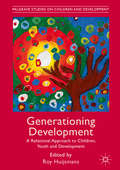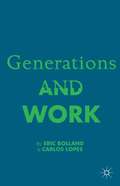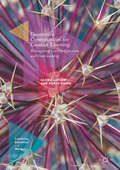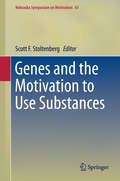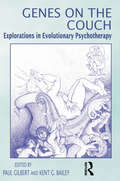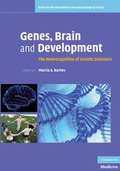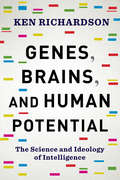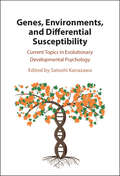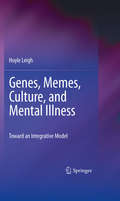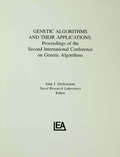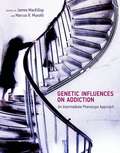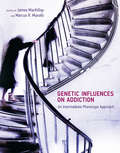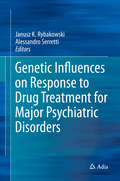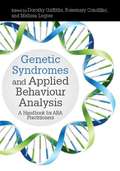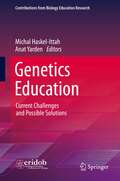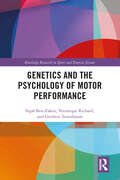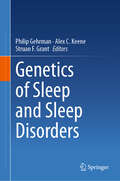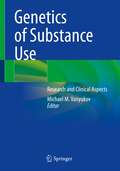- Table View
- List View
Generation, Discourse, and Social Change (Routledge Advances in Sociology)
by Karen R. FosterJust what is a generation? And why, if at all, does it matter? This book asks what generation means to ordinary people, arguing that generation is real and it matters, but not in the ways that we think. Generations are not groups of people who can be categorized and attributed with static, immutable and universal characteristics, nor are they reducible to cohorts, as is the tendency in much social research. Rather, the book reveals generation to be a social phenomenon and a mechanism of social change - as a constellation of ideas and discourses that explains what happens when ideas and ideals collide, and why some discourses flourish and take hold at particular times.
Generation: Preoccupations and Conflicts in Contemporary Psychoanalysis
by Jean WhiteGeneration is both an introduction to and a comparative study of contemporary psychoanalytic clinical theory. It provides the reader with a comprehensive overview of how new ways of thinking about the psychoanalytic process have evolved and are still in development today. Jean White presents a detailed study of contemporary Independent, Lacanian and post-Kleinian theory, set within the wider context of the international expansion of psychoanalysis. Contemporary clinical practice is discussed in relation to concepts of psychopathology, transference and countertransference and innovations in technique. Each school’s explicit and implicit models of psychic growth and their view of the aims of the psychoanalytic process are explored. Written in clear, accessible language and interwoven throughout with clinical vignettes, Generation provides an invaluable initiation into the work of notoriously difficult authors such as Lacan and Bion. This stimulating presentation of contemporary psychoanalytic theory will be of great interest to psychoanalytic psychotherapists, psychodynamic counsellors and psychoanalysts of all theoretical orientations.
Generationenübergreifende Analyse von Straftätern und die Rolle der emotionalen Intelligenz im Strafjustizsystem (essentials)
by Otilia Gudana Sabrina StamborskiIm Jahr 1996 wurde Gewalt weltweit zum Gesundheitsproblem erklärt und identifiziert. Das Risiko von Mord und Selbstmord erreichte epidemische Ausmaße und betraf bestimmte Bevölkerungsgruppen, darunter Jugendliche und Angehörige von Minderheitengruppen. Die Selbstmordraten bei Jugendlichen und jungen Erwachsenen (15 bis 24 Jahre) haben sich zwischen 1950 und 1990 fast verdreifacht. Ebenso haben sich die Mordraten bei 15- bis 19-jährigen Männern von 1985 bis 1991 fast verdoppelt. Diese Trends löste weltweit Alarm aus und verlangten nach neuen Lösungen.Die Motivation dieses Buches bestand darin, das Niveau der emotionalen Intelligenz von Kriminellen in Gefängnissen und in forensischen psychiatrischen Einrichtungen zu vergleichen. Das Hauptziel dieser Analyse besteht darin, sich auf Empfehlungen zum Training emotionaler Intelligenz zu konzentrieren, um die epidemische Gewaltraten von Insassen auf globaler Ebene zu senken.
Generationing Development: A Relational Approach to Children, Youth and Development (Palgrave Studies on Children and Development)
by Roy HuijsmansThis ground-breaking book weaves together insights from the children and youth studies literature and critical development studies. Debunking the idea of childhood and youth as self-evident social categories, the author unravels how these generational constructs are (re)constituted and experienced in relational terms in development contexts spanning both the Global South and the Global North. Running through these chapters is a fundamental concern with age, gender and generation as key principles of social differentiation. This is developed in Part 1 at a theoretical level, and applied to everyday contexts, including school, work, migration and the street in Part 2. Part 3 zooms in on the generational dynamics of development by exploring how prominent development interventions (conditional cash transfers, schooling) problems (gender discrimination) and questions (the generational question of farming) shape the (gendered) experience of being young and growing up.
Generations And Work
by Eric Bolland Carlos LopesBased on an extensive national survey of workers and four separate industry-specific surveys, Generations and Work will examine and provide answers to the most common issues and problems of multi generational work by assessing differences and commonalities between and among generations.
Generations and Collective Memory
by Amy Corning Howard SchumanWhen discussing large social trends or experiences, we tend to group people into generations. But what does it mean to be part of a generation, and what gives that group meaning and coherence? It's collective memory, say Amy Corning and Howard Schuman, and in Generations and Collective Memory, they draw on an impressive range of research to show how generations share memories of formative experiences, and how understanding the way those memories form and change can help us understand society and history. Their key finding--built on historical research and interviews in the United States and seven other countries (including China, Japan, Germany, Lithuania, Russia, Israel, and Ukraine)--is that our most powerful generational memories are of shared experiences in adolescence and early adulthood, like the 1963 Kennedy assassination for those born in the 1950s or the fall of the Berlin Wall for young people in 1989. But there are exceptions to that rule, and they're significant: Corning and Schuman find that epochal events in a country, like revolutions, override the expected effects of age, affecting citizens of all ages with a similar power and lasting intensity. The picture Corning and Schuman paint of collective memory and its formation is fascinating on its face, but it also offers intriguing new ways to think about the rise and fall of historical reputations and attitudes toward political issues.
Generations of Feeling
by Barbara H. RosenweinGenerations of Feeling is the first book to provide a comprehensive history of emotions in pre- and early modern Western Europe. Charting the varieties, transformations and constants of human sentiments over the course of eleven centuries, Barbara H. Rosenwein explores the feelings expressed in a wide range of 'emotional communities' as well as the theories that served to inform and reflect their times. Focusing specifically on groups within England and France, chapters address communities as diverse as the monastery of Rievaulx in twelfth-century England and the ducal court of fifteenth-century Burgundy, assessing the ways in which emotional norms and modes of expression respond to, and in turn create, their social, religious, ideological, and cultural environments. Contemplating emotions experienced 'on the ground' as well as those theorized in the treatises of Alcuin, Thomas Aquinas, Jean Gerson and Thomas Hobbes, this insightful study offers a profound new narrative of emotional life in the West.
Generative Conversations for Creative Learning
by Robyn Ewing Gloria LathamThis book builds on conversations between the author educators and other experts in the field, including authors, illustrators and teachers, to explore the benefits of discussions around quality literature within a classroom context that exercises the imagination and generates new ideas and discoveries. The book focuses on a range of strategies that can be utilised to reimagine literacy learning in a 21st century context including parent and teacher talk; active listening; fostering student driven questions; building vocabulary and imagery; and metacognitive talk. These are argued to have a hugely beneficial impact on how children learn to solve problems, engage in complex thought processes, negotiate meaning, as well as learning how to wonder, explore, create and defend ideas. The book also defends the importance of parents, teachers and academics as 'storytellers', using their bodies and voices as instruments of engagement and power. It will make compelling reading for students, teachers and researchers working in the fields of education and sociology, particularly those with an interest in creative methods for improving literacy.
Genes and the Motivation to Use Substances
by Scott F. StoltenbergHuman beings have been using intoxicating substances for millennia. But while most people have used psychoactive substances without becoming dependent on them, a significant minority develop substance use disorders. The question remains: why does addiction occur in some and not others? The 61st installment of the Nebraska Symposium on Motivation, Genes and the Motivation to Use Substances probes the complex role of genetics in substance use and abuse across diverse methodologies, research organisms, levels of analysis and disciplines. Its combined lifespan/motivation approach to individual differences sheds necessary light on genetic vs. environmental factors in vulnerability, addiction risk, the relationship between behavioral disinhibition and substance use and the motivation to quit. While alcohol use/abuse is the focus of much of the book, its chapters provide scientific and clinical insights into substance abuse in general as well as implications for treatment. And an intriguing conclusion discusses the need to bridge the gap between genetics and neuroscience and the best scientific conditions in which this integration may thrive. Included in the coverage: * Rodent models of genetic contributions to the motivation to use alcohol. * The adolescent origins of substance abuse disorders * The developmental matrix of addictive behavior * The genetics of cannabis involvement * The DNA methylation signature of smoking * Genomics of impulsivity: integrating genetics and neuroscience. Reflecting the current state of knowledge in a field with groundbreaking potential, Genes and the Motivation to Use Substances is a fascinating resource for psychologists, psychiatrists, geneticists, neuroscientists, social workers, policymakers and researchers in addiction.
Genes on the Couch: Explorations in Evolutionary Psychotherapy
by Paul Gilbert Kent G. BaileyPhilosophers and therapists have long theorised about how psychological mechanisms for love, jealousy, anxiety, depression and many other human characteristics may have evolved over millions of years. In the dawn of the new insights on evolution, provided by Darwin's theories of natural selection, Freud, Jung and Klein sought to identify and understand human motives, emotions and information processing as functions deeply-rooted in our evolved history. Despite this promising start and major developments in modern evolutionary psychology, anthropology and sociobiology, the last fifty years has seen little in the way of therapies derived from an evolutionary understanding of human psychology. The contributors to this timely book illuminate how an evolution focused approach to psychopathology can offer new insights for different schools of therapy and provide a rationale for therapeutic integration.Genes on the Couch brings together respected clinicians who have integrated evolutionary insights into their case conceptualisations and therapeutic interventions. Various psychotherapy schools are represented, and each author provides illustrative examples of the interventions used. Specific topics addressed include the nature of evolved mental mechanisms; regulation/dysregulation of internal processes; attachment and kinship in therapy; the importance of internalising warmth as a therapeutic goal; kin selection and incest avoidance; co-operation and deception in social relations; difficulties in working with certain male clients; gender differences in therapy and the roles of shame and guilt in treatment.Providing up-to-date summaries of recent thinking in this increasing important but diverse area, Genes on the Couch will be of interest to psychotherapists, psychiatrists and a wide range of mental health professionals.
Genes, Brain, and Development
by Marcia A. BarnesGenetic syndromes and neurodevelopmental disorders that have a genetic basis are associated with cognitive and academic disabilities. Genes, Brain and Development reviews the connections between genes, brain, and behavior for a range of genetic disorders, and also considers lifespan and treatment issues. The content further explores what is known about development in neurogenetic disorders, particularly in the domains of language and mathematics, and shows how this knowledge is pertinent to understanding both these specific disorders, and disorders of language and math more generally. This will be essential reading for a wide range of brain scientists and developmental clinicians, including neuropsychologists, cognitive psychologists, neurologists, psychiatrists, pediatricians, neuroscientists and geneticists.
Genes, Brains, and Human Potential: The Science and Ideology of Intelligence
by Ken RichardsonFor countless generations people have been told that their potential as humans is limited and fundamentally unequal. The social order, they have been assured, is arranged by powers beyond their control. More recently the appeal has been to biology, specifically the genes, brain sciences, the concept of intelligence, and powerful new technologies. Reinforced through the authority of science and a growing belief in bio-determinism, the ordering of the many for the benefit of a few has become more entrenched. Yet scientists are now waking up to the influence of ideology on research and its interpretation. In Genes, Brains, and Human Potential, Ken Richardson illustrates how the ideology of human intelligence has infiltrated genetics, brain sciences, and psychology, flourishing in the vagueness of basic concepts, a shallow nature-versus-nurture debate, and the overhyped claims of reductionists. He shows how ideology, more than pure science, has come to dominate our institutions, especially education, encouraging fatalism about the development of human intelligence among individuals and societies. Genes, Brains, and Human Potential goes much further: building on work being done in molecular biology, epigenetics, dynamical systems, evolution theory, and complexity theory, it maps a fresh understanding of intelligence and the development of human potential. Concluding with an upbeat message for human possibilities, this synthesis of diverse perspectives will engender new conversations among students, researchers, and other interested readers.
Genes, Environments, and Differential Susceptibility: Current Topics in Evolutionary Developmental Psychology
by Satoshi KanazawaThe evolutionary perspective has influenced many subfields of psychology and related social sciences in the last three decades. However, developmental psychology has remained largely immune to evolutionary thinking. What does evolutionary thinking have to offer developmental psychology and the study of child development? This book invites some of the leading figures in evolutionary developmental psychology to discuss cutting-edge research and its significance in related fields. By laying out the utility and importance of evolutionary thinking in developmental science, each chapter shows how the evolutionary perspective both opens new avenues of research by posing novel questions and providing insightful answers to age-old questions and debates. In the process, their overviews pay particular attention to the theoretical and empirical contributions of Jay Belsky, a pioneering developmental psychologist who has paved the way forward for the field. A short tribute and biography follow the chapters to pay homage to his work.
Genes, Memes, Culture, and Mental Illness
by Hoyle LeighWhat produces mental illness: genes, environment, both,neither? The answer can be found in memes--replicable units of information linking genes and environment in the memory and in culture--whose effects on individual brain development can be benign or toxic. This book reconceptualizes mental disorders as products of stressful gene-meme interactions and introduces a biopsychosocial template for meme-based diagnosis and treatment. A range of therapeutic modalities, both broad-spectrum (meditation) and specific(cognitive-behavioral), for countering negative memes and their replication are considered, as are possibilities for memetic prevention strategies. In this book, the author outlines the roles of genes and memes in the evolution of the human brain; elucidates the creation, storage, and evolution of memes within individual brains; examines culture as a carrier and supplier of memes to the individual; provides examples of gene-meme interactions that can result in anxiety, depression, and other disorders; proposes a multiaxial gene-meme model for diagnosing mental illness; identifies areas of meme-based prevention for at-risk children; and defines specific syndromes in terms of memetic symptoms, genetic/ memetic development, and meme-based treatment.
Genesis of Symbolic Thought
by Alan BarnardSymbolic thought is what makes us human. Claude Lévi-Strauss stated that we can never know the genesis of symbolic thought, but in this powerful new study Alan Barnard argues that we can. Continuing the line of analysis initiated in Social Anthropology and Human Origins (Cambridge University Press, 2011), Genesis of Symbolic Thought applies ideas from social anthropology, old and new, to understand some of the areas also being explored in fields as diverse as archaeology, linguistics, genetics and neuroscience. Barnard aims to answer questions including: when and why did language come into being? What was the earliest religion? And what form did social organization take before humanity dispersed from the African continent? Rejecting the notion of hunter-gatherers as 'primitive', Barnard hails the great sophistication of the complex means of their linguistic and symbolic expression and places the possible origin of symbolic thought at as early as 130,000 years ago.
Genetic Algorithms and their Applications: Proceedings of the Second International Conference on Genetic Algorithms
by John J. GrefenstetteFirst Published in 1987. Routledge is an imprint of Taylor & Francis, an informa company.
Genetic Influences on Addiction
by James MackillopAlthough there is scientific consensus that genetic factors play a substantial rolein an individual's vulnerability to drug or alcohol addiction, specific genetic variables linked torisk or resilience remain elusive. Understanding how genetic factors contribute to addiction mayrequire focusing on intermediary mechanisms, or intermediate phenotypes, that connect geneticvariation and risk for addiction. This book offers a comprehensive review of thismechanistic-centered approach and the most promising intermediate phenotypes identified in empiricalresearch. The contributors first consider the most established findings in thefield, including variability in drug metabolism, brain electrophysiological profiles, and subjectivereactions to direct drug effects; they go on to review highly promising areas such as expectancies,attentional processing, and behavioral economic variables; and finally, they investigate moreexploratory approaches, including the differential susceptibility hypothesis and epigeneticmodifications. Taken together, the chapters offer a macro-level testing of the hypothesis that thesealternative, mechanistic phenotypes can advance the understanding of genetic influences onaddiction. The book will be of interest to researchers and practitioners in a range of disciplines,including behavioral genetics, psychology, pharmacology, neuroscience, andsociology. Contributors: John Acker, Steven R. H. Beach, Gene H. Brody, Angela D. Bryan, Megan J. Chenoweth, Danielle M. Dick, Eske D. Derks, Mary-Anne Enoch, Meg Gerrard, FrederickX. Gibbons, Thomas E. Gladwin, Mark S. Goldman, Marcus Heilig, Kent E. Hutchison, Hollis C. Karoly,Steven M. Kogan, Man Kit Lei, Susan Luczak, James MacKillop, Renee E. Magnan, Leah M. Mayo, MarcusR. Munafò, Daria Orlowska, Abraham A. Palmer, Danielle Pandika, Clarissa C. Parker, Robert A. Philibert, Lara A. Ray, Richard R. Reich, Ronald L. Simons, Courtney J. Stevens, Rachel E. Thayer,Rachel F. Tyndale, Tamara L. Wall, Reinout W. Wiers, Michael Windle, Harriet de Wit
Genetic Influences on Addiction: An Intermediate Phenotype Approach (The\mit Press Ser.)
by James MacKillopA comprehensive review of research examining intermediary mechanisms to understand the link between genetic variation and addiction liability.Although there is scientific consensus that genetic factors play a substantial role in an individual's vulnerability to drug or alcohol addiction, specific genetic variables linked to risk or resilience remain elusive. Understanding how genetic factors contribute to addiction may require focusing on intermediary mechanisms, or intermediate phenotypes, that connect genetic variation and risk for addiction. This book offers a comprehensive review of this mechanistic-centered approach and the most promising intermediate phenotypes identified in empirical research.The contributors first consider the most established findings in the field, including variability in drug metabolism, brain electrophysiological profiles, and subjective reactions to direct drug effects; they go on to review highly promising areas such as expectancies, attentional processing, and behavioral economic variables; and finally, they investigate more exploratory approaches, including the differential susceptibility hypothesis and epigenetic modifications. Taken together, the chapters offer a macro-level testing of the hypothesis that these alternative, mechanistic phenotypes can advance the understanding of genetic influences on addiction. The book will be of interest to researchers and practitioners in a range of disciplines, including behavioral genetics, psychology, pharmacology, neuroscience, and sociology.ContributorsJohn Acker, Steven R.H. Beach, Gene H. Brody, Angela D. Bryan, Megan J. Chenoweth, Danielle M. Dick, Eske D. Derks, Mary-Anne Enoch, Meg Gerrard, Frederick X. Gibbons, Thomas E. Gladwin, Mark S. Goldman, Marcus Heilig, Kent E. Hutchison, Hollis C. Karoly, Steven M. Kogan, Man Kit Lei, Susan Luczak, James MacKillop, Renee E. Magnan, Leah M. Mayo, Marcus R. Munafò, Daria Orlowska, Abraham A. Palmer, Danielle Pandika, Clarissa C. Parker, Robert A. Philibert, Lara A. Ray, Richard R. Reich, Ronald L. Simons, Courtney J. Stevens, Rachel E. Thayer, Rachel F. Tyndale, Tamara L. Wall, Reinout W. Wiers, Michael Windle, Harriet de Wit
Genetic Influences on Response to Drug Treatment for Major Psychiatric Disorders
by Janusz K. Rybakowski Alessandro SerrettiWritten by global experts, this book provides a modern comprehensive insight into the pharmacogenetics of treatment of major psychoses: schizophrenia, bipolar disorder and depression. The pharmacogenomics of three categories of the most important psychiatric drugs, antipsychotics, antidepressants and mood stabilizers, has been updated and reviewed. Some promising directions and perspectives for future research in pharmacogenetics in major psychoses are indicated. They are, among others, connected with the development of new methods in molecular genetics and with linking pharmacogenetics assessment with biomarkers, including neuroimaging ones. Finally, the attempts to use pharmacogenetics of antipsychotic, antidepressant and mood-stabilizing drugs in practice are presented. New pharmacogenetic tools may greatly contribute to introducing personalized medicine into psychiatric clinical practice.
Genetic Syndromes and Applied Behaviour Analysis: A Handbook for ABA Practitioners
by Andrew Davis Sylvana Yeung Linda Moroz Dayna Taylor-Weir Jane Summers Shelley L. Watson Kerry Boyd Faten Matar Jeffery Hamelin Jennifer Tysick Lauren Ireland Emily Moxey Brenda Finucane Elliot Simon Barbara Haas-Givler Keeley White Sarah Ruiter Tali Amar Jan Frijters Joanna Cappuccitti Milena Kako Dorothy Griffiths Ami Morris Julie Krieger Carina Gratton Melissa Legree Rosemary Condillac Tracy Billingsley Diana Kondratenko Dalena Anzivino Anne Brennan Kristin BakerThis ground-breaking resource demonstrates how genetic knowledge can influence our understanding of a child's behaviour and therefore inform their behavioural support plan. With expert advice and clear instructions, it shows exactly how to go about incorporating syndrome knowledge into ABA practice and start treating children with specific genetic syndromes more effectively. Six different genetic syndromes are covered in detail, ranging from Angelman syndrome to Williams syndrome. The book also includes general sections on genetic intellectual disability syndromes and an explanation of ABA methodology. This will be an invaluable and enlightening book for ABA practitioners and other professionals supporting people with intellectual disabilities caused by a specific genetic syndrome from age 3 to young adult, providing the missing link between ABA and the role that genetics can play in accurate assessment and intervention.
Genetics Education: Current Challenges and Possible Solutions (Contributions from Biology Education Research)
by Anat Yarden Michal Haskel-IttahThis edited volume presents the current state of the art of genetics education and the challenges it holds for teaching as well as for learning. It addresses topics such as how genetics should be taught in order to provide students with a wide and connected view of the field. It gives in-depth aspects that should be considered for teaching genetics and the effect on the student’s understanding. This book provides novel ideas for biology teachers, curriculum developers and researchers on how to confront the presented challenges in a way that may enable them to advance genetics education in the 21st century. It reviews the complexity of teaching and learning genetics, largely overlooked by biology textbooks and classroom instruction. It composes a crucial component of scientific literacy.
Genetics and the Psychology of Motor Performance (Routledge Research in Sport and Exercise Science)
by Gershon Tenenbaum Sigal Ben-Zaken Véronique RichardDespite the prevalence of behavioral research conducted through genetic studies, there is an absence of literature pertaining to the genetics of motor behavior. Genetics and the Psychology of Motor Performance is the first book to integrate cutting-edge genetic research into the study of the psychological aspects of motor learning and control.The book’s central line of enquiry revolves around the extent to which psychological factors central to motor proficiency – including personality, emotion, self-regulation, motivation, and perceptual-cognitive skills – are acquired or inherited. It explains how these factors affect motor performance, distilling the latest research into their genetic underpinnings and, in doing so, assessing the magnitude of the role genetics plays in the stages of motor development, from early proficiency through to expertise.Written by leading experts in the genetics of human performance and exercise psychology, and thoroughly illustrated throughout, Genetics and the Psychology of Motor Performance is a crucial resource for any upper-level student or researcher seeking a deeper understanding of motor learning. It is an important book for anyone studying or working in exercise psychology, motor development, exercise genetics, or exercise physiology more broadly.
Genetics of Mental Disorders: What Practitioners and Students Need to Know
by Stephen V. Faraone Ming T. Tsuang Debby W. TangIntroduces ideas about inherited genetically based mental disorders and how they combine with environmental factors. thinks about mental disorders with insight.
Genetics of Sleep and Sleep Disorders
by Philip Gehrman Alex C. Keene Struan F. GrantThis book focuses on the latest research on the genetic basis of the regulation of sleep and wakefulness and of sleep and circadian rhythm disorders, which has been expanding rapidly due to advances in genetics. The book reviews the latest genetic discoveries in animals and humans and explores their implications for getting a good night's sleep. Philp Gehrman, Alex Keene, Struan Grant, and a cadre of top sleep researchers and clinicians explore the genetics of sleep and sleep disorders in depth. The book should appeal to sleep medicine specialists, psychiatrists, geneticists, and neuroscientists.
Genetics of Substance Use: Research and Clinical Aspects
by Michael M. VanyukovThe book illuminates the complex problems in genetic studies of substance use and addiction. It provides a comprehensive overview that fills the gap in the literature and points out future directions.The book includes three sections that apply to any complex traits and disorders, particularly psychological and psychiatric. The first section covers the traits and phenotypes that are the target of genetic research in substance use and addiction. Following this, the second section analyzes the methods and results of biometric genetic studies in this area. The third section reviews research in gene mapping and epigenetics. Genetics of Substance Use is a first-of-its-kind monograph that presents contemporary solutions and methods for a wide range of researchers and practitioners across disciplines.



